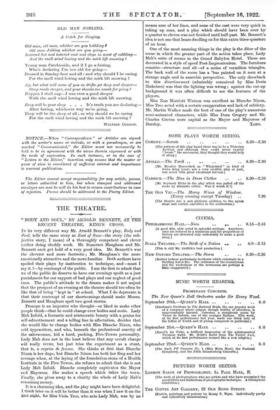THE THEATRE.
" BODY AND SOUL," BY ARNOLD BENNE'TT, AT THE REGENT. THEATRE, KING'S CROSS.
In its very different way Mr. Arnold Bennett's play, Body and Soul, tells the same story as East of Suez—the story (the sub- jective story, I mean) of a thoroughly competent and clever author doing shoddy work. Mr. Somerset Maugham and Mr. Bennett each got hold of a very good idea. Mr. Bennett's was the cleverer and more fantastic ; Mr. Maugham's the more emotionally attractive and the more familiar. Both authors have spoiled their plays by inattention to technique, and—must I say it ?—by contempt of the public. I am the first to admit that we of the public do deserve to have our evenings spoilt as a just punishment for our support of bad plays and our neglect of good ones. The public's attitude to the drama makes it not unjust that the prospect of an evening at the theatre should too often be like that of being " kept in " at school. What I do deprecate is that their contempt of our shortcomings should make Messrs. Bennett and Maugham spoil two good stories.
Procopo is an impostor who thought—or liked to make other people think—that he could change over bodies and souls. Lady Mab Infold, a fantastic and aristocratic beauty with a genius for self-advertisement and a telling line in affectation, decides that she would like to change bodies with Miss Blanche Nixon, who sold typewriters, and who, beneath the professional suavity of the saleswoman', hid a hard, pushing, Five-Towns personality. Lady Mab does not in the least believe that any occult change will really occur, but just tries the experiment as a stunt, that is, a caprice de femme. She thinks at first that Blanche Nixon is her dupe, but Blanche Nixon has both her fling and her revenge when, at the laying of the foundation-stone of a Health Institute in the Five Towns, she refuses to admit that she is not Lady Mab Infold. Blanche completely captivates the Mayor and Mayoress. She makes a speech which takes the town. Finally, she gives away to a charity the whole of Lady Mab's remaining money.
It is a charming idea, and the play might have been delightful. I think later on it will be better than it was when I saw it on the first night, for Miss Viola Tree, who acts Lady Mab, was by no
means sure of her lines, and none of the cast were very quick in taking up cues, and a play which should have been over by' a quarter to eleven was not finished until half-past. Mr. Bennett's idea is not one that bears dwelling on for that extra three-quarters of an hour.
One of the most amusing things in the play is the decor of the scene in which the greater part of the action takes place, Lady Mab's suite of rooms in the Grand Babylon Hotel. These are decorated hi a style of spoof Post-Impressionism. The furniture consists—structure and all—of a series of vermilion triangles. The back wall of the room has a 'bus painted on it seen at a strange angle and in anarchic perspective. The only drawback to this divertissement (admirably conceived by Miss Doris Zinkeisen) was that the lighting was wrong ; against the cut-up background it was often difficult to see the features of the players.
Miss Nan Marriott Watson was excellent as Blanche Nixon. Miss Tree acted with a certain exaggeration and lack of subtlety. Mr. Martin Walker made the best of one of the play's numerous semi-animated characters, while Miss Dora Gregory and Mr. Charles Groves were capital as the Mayor and Mayoress of


































 Previous page
Previous page